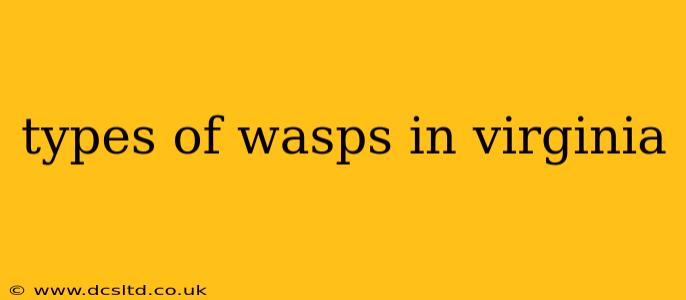Virginia's diverse ecosystem supports a wide variety of wasp species, some beneficial and others potentially problematic. Understanding the different types of wasps found in the state is crucial for coexistence and managing potential stings or infestations. This guide will explore common wasp species in Virginia, their characteristics, and how to differentiate them.
What are the most common wasps in Virginia?
Several wasp families are prevalent across Virginia. The most commonly encountered include:
-
Yellow Jackets ( Vespula and Dolichovespula species): These are arguably the most recognizable and feared wasps in Virginia. They are known for their aggressive behavior, especially when defending their nests. They are typically black and yellow striped, though coloration can vary slightly between species. They build nests underground, in wall voids, or even in attics.
-
Paper Wasps (Polistes species): Unlike yellow jackets, paper wasps are generally less aggressive unless their nest is directly threatened. They build open-comb nests, often under eaves, decks, or other sheltered outdoor locations. They are typically slender with long legs and are often brown, yellow, or reddish-brown in color.
-
Bald-faced Hornets (Dolichovespula maculata): While often called hornets, these are actually a type of yellow jacket. They are distinctive for their predominantly black and white coloration and their large, pear-shaped paper nests, usually high in trees or shrubs. They are also quite aggressive when defending their nests.
-
Mud Daubers (Sceliphron species): These solitary wasps are less aggressive and rarely sting. They build characteristic mud nests, often found on buildings, fences, or other structures. They are usually black or dark-colored with slender bodies. They are beneficial insects, as they prey on spiders.
-
Cicada Killers (Sphecius speciosus): These large wasps are intimidating in appearance but are generally docile unless directly handled. They are known for paralyzing cicadas to feed their young. Females are significantly larger than males.
How can I identify different wasp species in Virginia?
Identifying wasps requires careful observation of several characteristics:
- Body size and shape: Note the overall size, length of the body, and the relative size of the thorax and abdomen.
- Coloration: Pay close attention to the pattern and shades of color, including stripes, spots, and overall body tone.
- Nest structure: The type of nest—open comb, enclosed, underground, or mud—is a crucial identifier. The location of the nest can also offer clues.
- Behavior: Observe the wasps' behavior—are they aggressive, solitary, or social? What are they doing? Are they hunting prey?
What are the dangers of wasp stings?
While most people experience only localized pain, swelling, and redness from a wasp sting, some individuals are allergic and can experience a severe allergic reaction (anaphylaxis) that requires immediate medical attention. Symptoms of anaphylaxis can include difficulty breathing, swelling of the face or throat, dizziness, and loss of consciousness. If you suspect an allergic reaction, seek emergency medical help immediately.
What should I do if I find a wasp nest on my property?
If a wasp nest poses a safety risk, it's best to contact a pest control professional for removal. Attempting to remove a wasp nest yourself can be dangerous and may result in multiple stings.
Are there beneficial wasps in Virginia?
Yes! Many wasps are beneficial predators, controlling populations of other insects that can be harmful to crops or gardens. For example, parasitic wasps lay their eggs in other insects, helping to control pest populations naturally. Mud daubers, as mentioned earlier, prey on spiders. It's important to remember that not all wasps are dangerous or unwelcome.
How do I prevent wasp nests on my property?
- Seal cracks and crevices: Prevent wasps from entering your home by sealing any cracks or gaps in walls, windows, and foundations.
- Remove food sources: Keep food and drinks covered, especially outdoors. Clean up spills immediately.
- Keep trash cans sealed: Ensure garbage cans are tightly sealed to prevent attracting wasps.
- Maintain landscaping: Keep vegetation trimmed back from the house to reduce potential nesting sites.
This guide provides a general overview of common wasps in Virginia. If you encounter an unusual wasp or are unsure about a species, you may want to consult resources such as your local agricultural extension office or a university entomology department for further identification and advice. Remember always to approach wasps cautiously and avoid disturbing their nests whenever possible.
